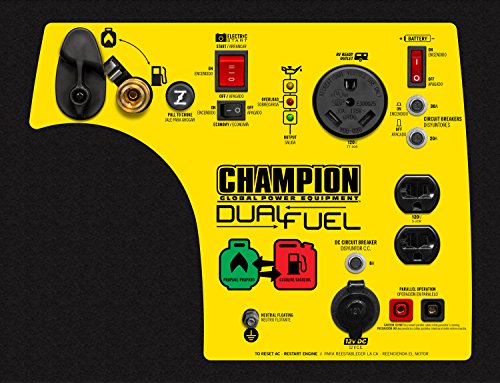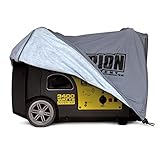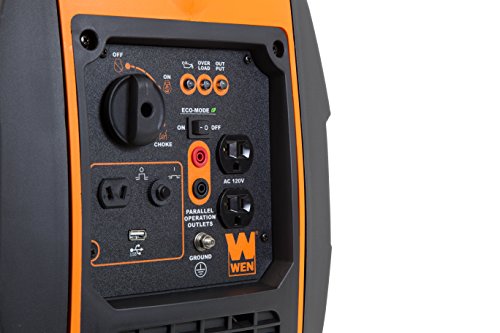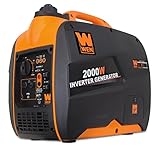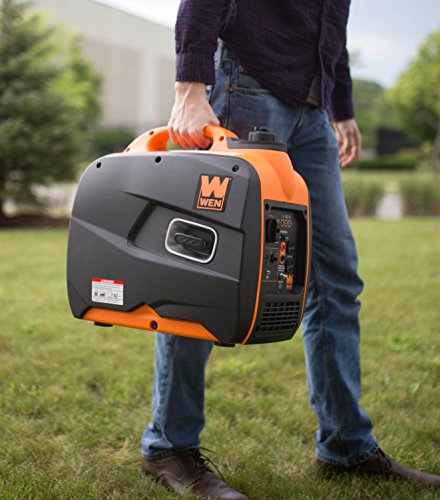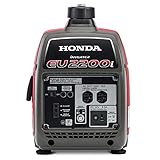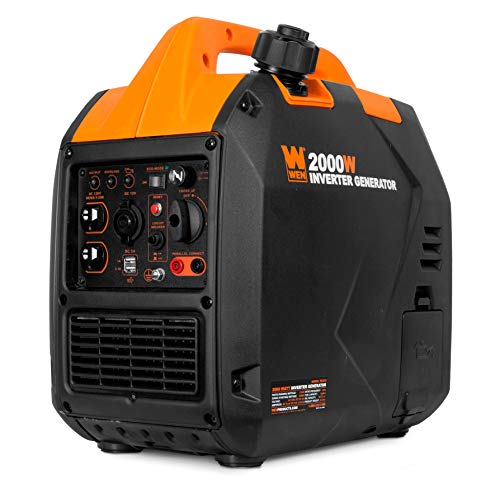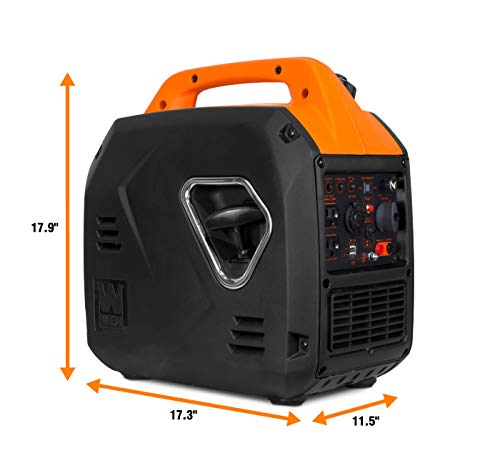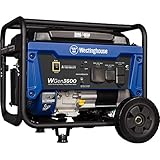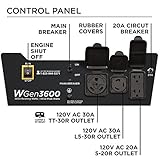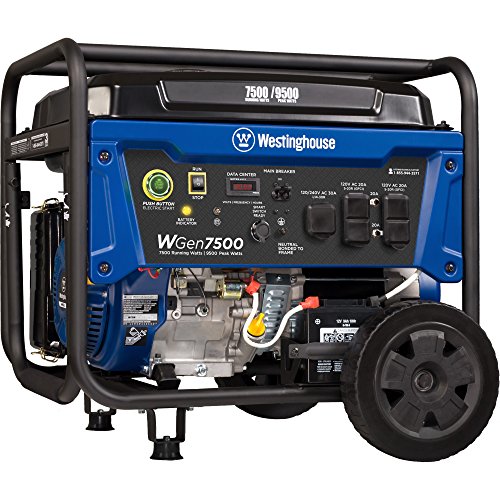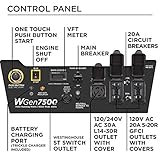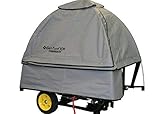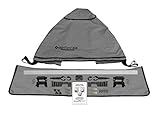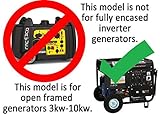
This is an ultimate guide, so can bet it will be wayyy too long. Here are a few quick links to get around (yes, besides the table of contents):
- Overall Best Choice
- Best for Camping
- Best Deal
- How Much Power Do You Need (for RVing, Camping, Or Both)?
- Things To Consider When Buying a Generator
Our Favorite 8 Generators
[amazon table=”632″]
Obviously, a lot goes into choosing the best of something. Heck! We barely scratched the surface. But for everything we consider important, our favorite generator is the best balance of whisper quiet, most portable, easiest to use, and overall top choice you could ask for.
FYI: I’m going to do an incredibly thorough review of #1 (right below). Skim past it to see the other seven or jump past.
1. Champion 3,400 Watt (Overall Favorite)
…Dual Fuel RV Ready Portable Inverter Generator with Electric Start (Yes, they all have really long names)
Whether it’s camping, RVing, air conditioning, boating, or anything, this is the first generator to consider. The Champion series is the best out there (and not just because of the name).
While we’ve selected the 3,400-Watt model as the all-around top, we have compared two other highly-rated models below if there is a particular size or power output you’re looking for.
We chose the Champion 3,400W because it offers more than enough power at a reasonable volume and price. Also, it has wheels for portability and is an incredibly flexible inverter generator. Not only is it a great fit for RVers and campers, it also works well for tailgates and even has enough power to take double duty during power outages—it always has your back!
Pros
- 120V / 30A outlet specifically for RVs
- Takes gasoline or propane
- Clear and easy-to-use control panel
- Supports parallel system (run two together to double power)
- 2 Household Outlets
- Low oil shutoff sensor
- Durable: cast iron sleeve
- Comes with 2 USB adapters
Cons
- Weight (heavy, though it does have wheels)
- Price (sort of…you’re paying for quality and power)
Power
I doubt you know the exact amount of power your RV needs, but for almost everyone 3,400 watts is plenty (if you’re camping, 3,400W would probably cover the whole campsite). 2,000W is easily enough to supply power for things like:
A 30 Amp RV (if you don’t know what that means, quickly jump over to our guide to RV plugs and wiring) can run a maximum of 3,600 Volts in its system.
120 Volts X 30 Amps = 3,600 Watts
You can have less, of course, but not more.
3,400 Watts, is perfect then, for 30 Amp RVs.
If you have a 50 Amp RV, still use the 3,400 Champion generator. All you have to do is hook two up in parallel (see how).
The Champion has the same kind of RV ready outlet you’d find at an RV stop (120V), 2 regular household plugs, and the ability to connect it to other generators to use in parallel (if you’ve got, say, a beast of an air conditioner).
Speaking of power, when you factor in AC the Champion steps up…
Air Conditioning
Most air conditioners you’ll find in RVs sit somewhere between 1,600 to 2,500 watts on startup and run much less than that. The Champion, at 3,400 watts can take it and all your other demands easily.
Fun Fact: This model has a starting wattage of 3,400W and a running wattage of 3,100W.
If you want more details, jump down to the AC units section.
Portable
If it’s on wheels, it’s portable—that is the rule for most things, including inverter generators. Regular generators are called portable if they move at all.
This portable Champion is 95.7 pounds, which would be a problem if it didn’t have wheels.
One of the biggest cons of this model is the weight. It can be difficult to lift this unit in and out of an RV, truck, or car, especially alone. If you think this may be a problem, check out our super portable star. That said, most people out RVing are pretty capable. Don’t underestimate yourself!
Quiet
The decibel rating of this generator is 59.0 dB. While that’s not whisper quiet, it is about normal conversation volume.
It also has an economy mode to save fuel and make it run quieter, in case regular operation is too loud for meditation or nap time. (Seriously!)
Funny Fact: Say something out loud. The average voice is about 59.0 dB. I wanted to give you an example with an audio clip, but then I realized I don’t know where your volume is set.
Clean Power
All Champion generators we’ve considered (and the rest on this page, actually), have “clean energy” because they have less than 6% THD. In fact, these Champion generators have less than 3%. Learn what THD is and why low THD is great for batteries.
Looks
I admit, visual appeal is not the first thing that springs to mind when you think generators, much less RV generators. But why not? Normally you picture an industrial tank belching smog, whirring dangerously off behind a bush.
Needless to say, seeing a Champion generator (or any of the enclosed, inverter generators on our top picks list) sitting next to the RV is a thing to be proud of. I’d go so far as to say it’s something to admire after a day of long traveling.
Oil
FYI the 3400 Watt Champion takes 0.6 quarts of oil. They recommended 10W-30.
Summary
The Champion 3,400 Watts is heavy, but it’s quiet, clean, stylish, economic, and powerful. It comes at a price (see it here), but from my research it is the best one out there. If you’re not sold, keep reading—see the competition. Otherwise, learn even more and get your own.
Don’t Forget About A Generator Cover
Yes, they’re real. Yes, we cover them in extreme detail. And yes, of course the Champion 3400 Watt has a custom cover. It shouldn’t need to be said, but separating water and electricity is one of the most important and iconic safety rules ever.
Protect your generator from the elements for $17 (as of the time of writing this). Trust me, it’s worth it.
FYI: This cover fits all inverter Champion generators 3,100 Watts and above. Don’t run the generator with the cover on it.
Time for the Other 7: Situational RV Gens
We realize that you may have some non-negotiables when you’re out researching a generator. That’s the best way to buy anything: figure out exactly what you need (not want), then find the cheapest product that ticks off every box on the need list.
Anyway, this section covers portable quiet generators for camping and RVs, but finds the best for each of the most important characteristics: portable, power, price (for the money), quiet, small RVs, and for camping. Please note these are all the best inverter generators. Learn why we recommend only inverter generators for RVs, camping, campers, and travel trailers.
The numbers are for navigation, FYI, not for ranking. Each generator is the best in its category.
Best RV/Camping Generator For the Money
Though this section is about the best deal, don’t worry—we won’t be skimping on quality. For less cost, it generates less power. This the only comprise we’re making to shrink the budget.
So long as you don’t have an RV with a really fancy AC system, you should be fine.
Camping Sidenote: Camping is about getting away from technology, right? Though don’t worry, we enjoy air conditioning—one of the best inventions ever, if you ask me.
That’s why you should check out our article on tent air conditioners and heaters. They’re real and actually quite popular—a glamping essential. Check it out!
2. WEN 56200i Super Quiet 2000-Watt
…Portable Inverter Generator, CARB Compliant
This model almost won our award for most quiet generator. It has a decimal rating of 51 dB. Also, a variety of outlets built into the generator make it incredibly versatile.
The main reason this generator is second and not first is because of its low running power, at 1600W. It also has a (relatively) low run time. At ½ load of the fuel tank it will run for 6 hours. Both may sound very good—and they are! We just have high standards.
If 1600 W is all you need, this is the generator for you. With or without an RV to power, the WEN 56200i is a quality generator. I would go so far as to call it the perfect generator for camping without an RV.
If you’ve brought your phone or laptop along—I’d be surprised if you didn’t these days—the THD of this model is renown for not exceeding 1.2% (plug your chargers straight into the outlets on the back)!
Pros
Cons
Our second place for the money is the Westinghouse iGen2500 Inverter Generator. It won our place as the best generator for camping, a large reason it didn’t get best generator for the money. It’s also a bit more expensive.
Best Inverter Generator For Small RVs
The key factors that go into choosing a power source for a small RV are…
- Extremely portable
- Extremely Quiet
- Power (somewhere in the middle)
- Compact
This is the generator that best meets those needs:
3. Honda EU2200i 2,200 Watt
…Super Quiet Gas Power Portable Inverter Generator
The Honda excels in all these categories. Its volume rating of 47-58 dB, meaning it may be the quietest on the market. This rating makes it great for RVs, camping, and tailgating—any outdoor event with other people around.
It has what is called an eco-throttle system, which, in combination with its inverter system, means it is incredibly fuel efficient. The quality, durability, and lifetime value make it worth the price. It produces clean energy from a small, compact design.
It is also highly versatile, with an exceptional THD level. The electrical output is alternating 120V 15 Amp current (explanation). The control panel, as you can see, allows for parallel operation, where you connect two or more generators in sequence to sum their power.
Pros
Cons
Most Quiet Generator For RVs, Camping, & Trailers
If you’ve been reading through, you have already seen the best whisper quiet generator. It’s the Honda, a two time winner for volume and the best for small RVs.
If you missed it, don’t worry. Hop back and check it out.


It also won first place for the best generator for small RVs—the smaller the power demand, the smaller the generator, the quieter the noise (but not too small, at 2,200 Watts). It utilizes an eco-throttle system you’ll only find in Hondas which makes it both quiet and fuel efficient.
Best Inverter Generator For Camping (And High Fuel Efficiency)
Camping is an essential part of RVing but you don’t have to have an RV to go camping.
Heck, your car becomes a recreational vehicle when you take it camping!
The problem with camping is that you’ve got your tech with you. You have lights, maybe an electric grill, your phone, computers, a camera (don’t forget it).
Our top choice for camping generators provides ample power while staying quiet.
Whether you’re in a busy campsite or the middle of nowhere, we tried to pick a reliable choice.
To go camping, you want to forget about the generator. Turn it on, stick it out in the woods with a quality extension cord, and trust your devices stay powered.
The Westinghouse is a great choice.
5. Westinghouse iGen2500 Inverter Generator
This model is very similar to our top choice for small RVs (the Honda). They both are…
- Extremely portable
- Extremely Quiet (52 dB)
- Not too powerful (running 2,200w)
- Compact
However, this Westinghouse model has an appealing LED display. This high-tech display is beyond any other generator on this list and any (that I’ve found) not produced by Westinghouse.


One problem with the Westinghouse is that it cannot take propane.
Though this model does not have the eco-throttle system of the Honda (it is exclusive, after all), the Westinghouse has an efficiency mode.
Further, this specific Westinghouse model has over 1,000 review on Amazon alone, ranked above 4.5 stars. It is one of the most popular RV generators for camping out there.
Most Portable Inverter Generator for Camping & Trailers
The most portable, like the quietest, is a straightforward choice. I’ve scourged the market for the lightest generator from a reputable manufacturer. This fits the bill.
6. WEN 56202i Super Quiet 2000-Watt Portable Inverter Generator, CARB Compliant
There really isn’t much to say for this one. It’s a quality generator for a good price. It is extremely light, sitting at 38.6 pounds.
We rank another WEN generator (also 2,000 Watts) as the best choice for the price. It comes in at 48 pounds, 10 pounds heavier than this model.
It has a few more features like another USB port plus all the internal modifications that change the weight so much.
The tradeoff for low weight, like mentioned before, is power.
Still, the WEN 562029i has a starting wattage of 2,000 and runs at 1,700 watts.
The Beast: An Extremely Powerful Generator
I’m making an exception in this page: to include a non-inverter generator. I know, it is heinous. But some RVs are massive and—needless to say—this will be the most powerful generator on this list of the best.
7. Westinghouse WGen3600v Portable Generator
The problem with regular generators without inverters is…not just one thing, actually, but a whole list. First off, they’re much louder.
Another problem is their THD (the cleanliness of their electricity). I wouldn’t go charging your phone by plugging directly into the outlets on the generator itself.
That said, the Westinghouse does come with RV-ready plugs. It’s 30 Amps at 120 Volts—check out our full article RV wiring.
Being a larger generator, it can run for 18 hours (something you won’t get, I have to admit, with an inverter gen). There’s also a 3 year warranty—something we like about Westinghouse as a manufacturer.
The Westinghouse certainly comes with plenty of power. It’s called the beast for a reason: 3,600 Volts is the running power. The starting power peaks at 4,650V.
Pros
- Power
- 18 Hour Runtime
- Price
- RV Ready Plugs
Cons
- Noise (over 70dB)
- Size
- High THD
- Less Portable
If you have doubts about choosing one with enough power, this is the generator for you.
Because it is not an inverter generator, the extra power does not add to the cost—the opposite, in fact. For non-inverter generators, 3,600 Volts isn’t that impressive.
Overall, non-inverters have their own pros—power and runtime—while also cons comparatively—noise and THD. All (on this list, at least) are highly-rated, quality generators designed to be safe and reliable.
Like everything, what you choose to run your RV and camping trips is situational. If you need power, this Westinghouse model is the solution. If not, go back and find an inverter. As you can probably tell, I love my portable inverter generators.
One last thing: this engine has an open body, which means it should have a generator cover.
When I say should, I mean it needs one if you plan to run it in any rough weather (even if you’re saying no to yourself, do you really trust the weatherman with all of your electricity?). We cover them later in the article. Jump down there now.
Best 50 Amp Generator
If you’ve noticed, all the generators above are 30 Amp. It’s not surprised, as they’re all inverter generators.
(So yes, that makes the Champion 3,400 Watts the best 30 Amp generator.)
The best 50A choice—all, 50 Amp choices, actually—for me to go beyond the scope of inverter generators.
My dear inverters simply cannot produce enough power.
I have to admit, the title of ‘Beast’ should go to this one…but honestly, its power is unreal. That’s why I went with title of ‘Monster’.
8. The Monster: Westinghouse WGen7500
The 7,500 in the name is 7,500 running watts. The surge is 9,500. So yes, it is a monster.
I decided to include this on the list because…I couldn’t resist.
If you want an engine to serve as a backup generator for your house that doubles as an RV generator, this will certainly do.
I wouldn’t recommend taking this camping (it is loud) but it can run any RV on the planet. (If you find an exception, please let me know!)
Summary
And there you have it! Whatever your situation, there’s always a best generator for the job.
I sincerely hope we help you find yours. In short, we think the best camping and RV generators are…
- Champion 3,400 Watts is the best overall
- WEN 56200i is the best deal
- Honda EU2200i is the best for small RVs
- Westinghouse iGen2500 is the best for camping
- WEN 56202i is the most portable
- Honda EU2200i is the quietest
- Westinghouse WGen3600v is very powerful
- Westinghouse WGen7500 is the most powerful
If none of these fit your needs, email us at info@rvsupplyco.com and we’ll help you find one!
Generator Covers
Did you know there were such things? If there are RV covers, motorcycle covers, and backpack covers, then of course there are generator covers!
GenTent is our #1 choice of generator covers, essential when RVing, camping, tailgating, and nice to have anywhere else, just in case.
We love GenTent because it is designed to be in place while the generator is running, something you have to be extremely careful about when purchasing any generator covers.
Safety first: Most generators’ exhaust contains carbon monoxide. Make sure to always set it up twenty feet from your RV or camping area, exhaust pointing away.
The setup can be a bit of a pain, as Kelly from Camp Addict explained in her full report.
The silver lining is that once it is assembled, it doesn’t have to be fully dismantled to move or store.
We recommend GenTent because it takes its job seriously. It is just a cover, plain and simple, but it is patented, for Pete’s sake! It protects your machine from:
- rain
- snow
- ice
- sleet
- wind
It is designed for universal use of all generators from 3,000 to 10,000 Watts. Our first choice, the Champion 3,400 Watt does not require a cover because it is a fully encased generator. Many of the other generators listed here do not require a cover either; they are enclosed.
The GenTent cover separates electricity for water—a very good thing. If you don’t have one yet, get one now.
The Checklist: Things to Consider When Buying A Generator for RVing & Camping
- Power
- Price
- Noise
- Weight
- Inverter or Regular (THD and AC/DC)
- Interface
- Looks?
Air Conditioner (AC)
There are many different types of AC units out there for RVs, much less beyond. You’ll have to check your user’s manual (or it might be on the actual unit), but I’d guess your unit has less than 2,000 W running power demand.
Note: Your AC definitely lists BTU somewhere. If you can’t find watts, anything under 14,000 BTU should be fine for the Champion 3,400 Watts. For other generators, check this guide.
However, it takes more power to start an AC unit than to run it. Be sure to check both values—”starting” or “surge” values and “running” wattage—when choosing your generator. Make sure your generator model has a “running” wattage that at least matches the “surge” wattage of the AC.
What Are Inverter Generators? And Why Are They Awesome?
In terms of power generators, inverters are better. They are quieter, smaller, lighter, and more efficient than regular generators.
Standard generators spin at a constant RPM (rotations per minute) and get a set AC output from them. In the US it’s 120 V at 60 Hz.
Inverters (shortened way of saying inverter generators, not only the inverting piece itself) spit out a higher output of AC power initially. The unpredictability of the high power can’t be used directly. Instead, it is converted to DC current, then inverted back to 120 V at 60 Hz.
Inverter: a device for converting direct current into alternating current
Merriam Webster
The new power has a sine curve, fluctuating between crests. The smoothness of this sine curve is, essentially, its THD level. Inverters, because of how they switch electricity back and forth, have an incredibly small THD level.
Inverter generators are awesome because they adjust their fuel consumption and power output based on demand.
The more energy you need, the more they make.
The Difference Between Alternating Current & Direct Current (AC/DC)
You can think of current as a closed loop, a circular pipe of water. Moving the water transports power. If you move some water forward, the water behind it flows into its spot and all the rest moves too.
Except the water is electrons, elementary particles (the smallest particles in existence—smaller than an atom).
DC is direct current. Direct current works like the pipe example. In batteries, chemical reactions push the electrons through the circuit like a pump. On one end they pull electrons into the reaction, on the other they push electrons out. The compressed water at one end pushes all the other water around the circuit to fill the uncompressed section where the battery took in the electrons.
AC is alternating current. It works a bit different. Instead of pushing all the electrons continually around, it pushes them forward for a second, then flips around and pulls them back for a second, and forward, and back. It alternates.
Alternating current appears in wall outlets. It is generally considered better because it is more stable.
Source: http://www.generatorgrader.com/what-is-an-inverter-generator/
What Is THD?
Total Harmonic Distribution, measured as a percentage, is the quality of electricity. You can think of it as a value of how accurate the electricity is in terms of power. The math behind it is…complicated, to say the least. It has to do with the accuracy of the sine curve of the outputted AC.
But all it really means is that the smaller the THD, the better the electricity is to power sensitive devices, like a phone. Anything below 5% is considered clean electricity and acceptable for all computer chips pre-quantum, where clean electricity is much less important than a quiet work environment.
The other side of the coin is THD measuring above about 6%, which is considered—you guessed it—unclean electricity. Most standard, non-inverter, regular generators hit somewhere around the range of 9% THD, even getting up to 30% in some cases.
The problem with using THD in, say, a TV for example, could be blurred lines. However, its no trouble for lights, most appliances, heating elements, all the way to crass jackhammers and construction equipment.
The computer chips inside them simply aren’t fit to handle the unpredictable nature of inconsistent energy. They are too fine, too precise to be able to account for massive swings and still have the precision of their engineering.
As most RVers bring their devices, even if their RV can take high THD we champion the Champions among other low-THD portable generators.
Source: http://powerupgenerator.com/total-harmonic-distortion-portable-generators/
Whisper Quiet Generators
If a generator can stay below 70 dB, its good. If it can keep itself below 60 dB, that’s awesome. Anything above 80 dB becomes a problem—something, we joke, you’d want a long extension cable for. (Though seriously, you would. We like the American-made all-weather US Wire and Cable 50 footer). We recommend an extension cable for anything over 65 dB.
What Is a Decibel?
The standard way to measure noise is a decimal reading at 23 feet. Decibels work on an odd system, similar to a logarithmic scale, where an increase of 10 times the volume correspondence to 10 dB. For example, a sound increase of 1,000 times is 30 dB higher (103 = 1,000).
- No sound – 0 dB
- Whispering – 15-30 dB
- Regular talking – 60 dB
- Alarm clock – 80 dB
Long or significant exposure to >85-90 dB can cause hearing loss.
- A car horn – 110 dB
- Plane engines (at takeoff) – 120 dB
- Ambulances – 130 dB
- A gunshot – 140 dB
Above 140 dB is painful and causes permanent hearing loss.
Quick FAQ
In terms of power generators, inverters are better. They are quieter, smaller, lighter, and more efficient than regular generators.
Standard generators spin at a constant RPM (rotations per minute) and get a set AC output from them. In the US its 120 V at 60 Hz.
Inverters (shortened way of saying inverter generators, not only the piece itself) spit out a higher output of AC power initially. The unpredictability of the high power can’t be used directly. Instead, it is converted to DC current, then inverted back to 120 V, 60 Hz.
Most inverter generators have the ability to be run in parallel (with another of the same manufacturer). Most companies will sell a parallel kit that makes it easy to connect two generators.
We favor the Champion generators—specifically the 3,400W—for RV and camping generators. But if you need more power, get the Champion RV ready parallel kit.
Other manufacturers sell their own kits. This is the WEN kit and this is the Honda kit. Find others here.
Like anything, there isn’t just one answer. That said, we recommend the Champion 3,400 Watts as an end-all be-all of RV and camping inverter generators.
Not only is 3,400 watts plenty for almost any RV, it is quiet, portable, and comes with many features that make versatile as well. Another pro is that it’s designed to run in parallel (for the giant RVs out there). Read our full review.
Ah! What a question! It’s difficult to give a good answer because it is so situational. If you have the time, read this section of the article (or the whole thing). Then you’ll have a good idea of what you need and the options that meet those needs.
The quick answer is the quiet, portable Champion 3,400 Watt. Unless you have multiple large AC units, 3,400 Watts should be plenty. You can read why we like it so much or just jump to the product page.
Every manufacturers sells their own kits because inverter generators are not made to run in parallel between manufacturers. They prefer you buy two other theirs rather than only one.
We like the Champion generators the most; this is their kit. The WEN kit and the Honda kit are other good options. Find others here.
The larger the generator, the more important a cover is. That said, separating water from electricity is critical for any device. Generators are no exception—the opposite, really.
That is why covers are so important. They protect your generator from ice, rain, wind, snow, and anything else falling from the sky.
Furthermore, you have to be incredibly careful to only run covered generators if the cover is designed for it. We favor GenTent’s patented universal cover for generators from 3,000 to 10,000 Watts.
Your first oil change comes after 20 hours of use or one month.
The standard response after change #1 is every 6 months or 100 hours, whichever comes first. However, I just recommend replacing the oil at the start of the season. Unless you really rev up your generator constantly, it should be fine.
Every model is different, so check the instruction manual (when you first get it) to see what type of oil it requires (the viscosity). If you’re not sure, this motor oil is a great choice.
*Something you shouldn’t forget: when you first buy your generator you may not have any oil to begin with. Make sure to check before powering up.
Most portable/inverter generators range from 50-75 dB. Anything lower than 60 can be called a quiet generator. 60 dB is around conversation volume. If it gets up to 75-80 dB, you might consider getting an extension cable.
Our quietest generator on our list—which won both the title of the best generator fo small RVs and the whisper quiet generator—is the
Honda EU2200i. It can get as low as 47 dB.
Total Harmonic Distortion, measured as a percentage, is the quality of electricity. You can think of it as a value of how accurate/consistent the electricity is in terms of power. The more electricity a device takes, the less THD matters. For things like phones and computers, THD has to be low—less than 5%. That’s why we prefer inverter generators for RV and camping use
The standard way to measure noise is a decimal reading at 23 feet. Decibels (dB) work on a logarithmic system where an increase of 10 times the volume correspondence to 10 dB. Ever increase of 10 decibels means the sound is 10 times louder, so an increase of 100 decibels is 10 billion times louder (10 to the 10th power).
Most portable/inverter generators range from 50-75 dB. Anything lower than 60 can be called a quiet generator. 60 dB is around conversation volume. If it gets up to 75-80 dB, you might consider getting an extension cable.
Our quietest generator on our list—which won both the title of the best generator fo small RVs and the whisper quiet generator—is the
Honda EU2200i. It can get as low as 47 dB.
Images sourced from Amazon API, manufacturer’s website, in the public domain, or/and sourced in the caption or near the image. Featured (top) image by Eugene Quek.
Disclaimer: RV SUPPLY Co is part of the Amazon affiliate program, which means we may be paid for qualifying purchases made through our links.



